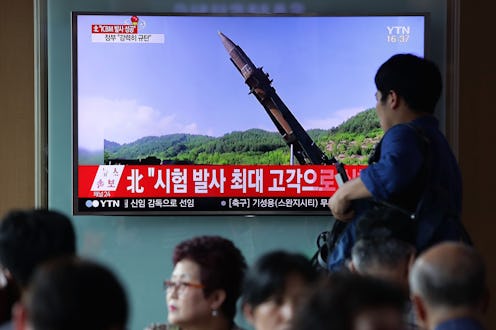News
North Korea's ICBM Test Is Part Of A Larger Strategy

On Tuesday, North Korea successfully tested an intercontinental ballistic missile (ICBM) that U.S. officials believe could travel some 4,000 miles — essentially putting Alaska at risk of attack. If one assumes that the country can or soon will be able to fit a nuclear warhead onto one of these missiles, you can understand why this update is concerning not just for allies in the region but for the Western world, too. Which might leave you wondering: What does North Korea want, exactly?
Unfortunately, evidence would point to the North Korean dictator, Kim Jong-un, being altogether unpredictable and unwieldy, like when he had his half-brother assassinated in a Malaysian airport earlier this year. But according to experts, this ICBM test actually does fit with a strategy the North has followed for years.
B.R. Myers, who works at Dongseo University in Busan, South Korea, studying the North's propaganda and ideology explained his views to Slate in February after one of the earlier, failed missile tests. He says that the North's ultimate goal is a peace treaty with the South and United States that results in a unified Korea and a withdrawal of U.S. weapons and troops from the region.
The reason, then, for the big push on nuclear weapons — and missiles capable of delivering them — is to strengthen its negotiating hand with the other two parties at the table, the South and the United States. That would seem to be the long game.
In the meantime, though, this missile bravado strengthens Kim's position with three important groups. One: His own people. Consider the huge parades that foreshadowed this missile test. That was not just to influence foreign governments but also his own people and any potential reform-minded people in the country who might try to overthrow power from within.
China is also an important ally of North Korea and keeping them supportive will be vital to any North Korean success. It's the country's largest trading partner and a big supplier of fuel. But it also has tried to meddle in the country's politics before. Back in 1956, China tried to maneuver to oust Kim's grandfather. With nuclear weapons, Kim probably thinks he can avoid that.
The third group that is important in the short term is South Korea. Kim thinks that with the increased military might he can push for the South to increase its aid to the North, Isaac Stone Fish, senior fellow at the Asia Society's Center on U.S-China Relations, argues in The Guardian. This could be direct aid, as the North has asked for in the past or through the reopening of Kaesong industrial zone, an area of factories that is joint run. Wages paid to North Korean workers largely go to support weapons programs and the government elite.
Finally, another potential motivator for Kim: Staying in power. The United States, being the strongest country in the world, does have some say on the matter — whether it should or not. And if you look at what the United States has done to other dictators in recent decades (Saddam Hussein and Muammar Gaddafi for example as Foreign Policy points out), Kim probably wants to bulk up his defenses.
So this news might simply be Kim looking out for his own hide, bolstering his position with his people, China, and South Korea, and finally working towards a unified Korea under his role. That means you have to take these ICBM tests rather seriously.